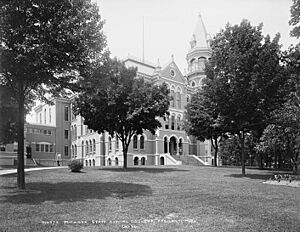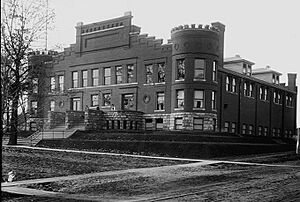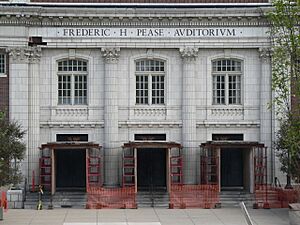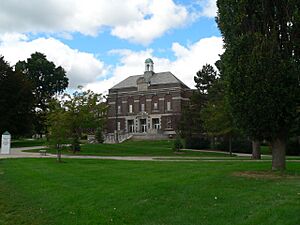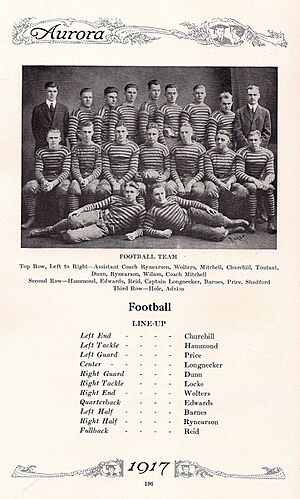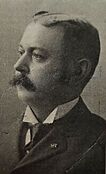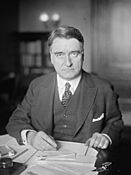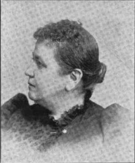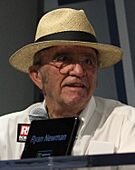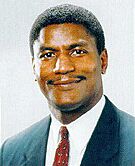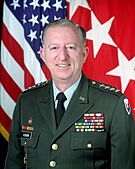Eastern Michigan University facts for kids
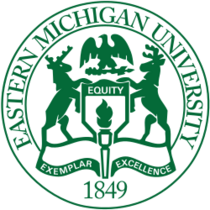 |
|
|
Former names
|
Michigan State Normal School (1849–1899) Michigan State Normal College (1899–1956) Eastern Michigan College (1956-1959) |
|---|---|
| Motto | "Equity, Exemplar, Excellence" |
| Type | Public research university |
| Established | 1849 |
| Accreditation | HLC |
|
Academic affiliations
|
Space-grant |
| Endowment | $94.01 million (2022) |
| President | James M Smith |
| Provost | Rhonda Longworth |
|
Academic staff
|
991 (2024/25) |
|
Administrative staff
|
869 (2023/24) |
| Students | 12,663 (fall 2024) |
| Undergraduates | 10,470 (fall 2024) |
| Postgraduates | 2,193 (fall 2024) |
| Location |
,
,
United States
42°15′01″N 83°37′28″W / 42.250154°N 83.624454°W |
| Campus | Large Suburb, 800 acres (3 km2) |
| Newspaper | The Eastern Echo |
| Colors | Green and white |
| Nickname | Eagles |
|
Sporting affiliations
|
|
| Mascot | Swoop |
Eastern Michigan University (EMU) is a public research university in Ypsilanti, Michigan, United States. It started in 1849 as the Michigan State Normal School. This was a special college for training teachers. It was the fourth "normal school" in the U.S. and the first outside of New England.
In 1899, it became the first normal school in the country to offer a four-year degree. The college officially became a university in 1959. EMU is one of eight research universities in Michigan. It is known for its high research activity.
The university has eight main colleges and schools. These include the College of Arts and Sciences and the College of Business. The campus covers 800 acres and has over 120 buildings. In 2023, more than 13,000 students attended EMU.
Since 1991, EMU's sports teams have been called the Eastern Michigan Eagles. Their mascot, Swoop, was chosen in 1994. The Eagles compete in NCAA Division I sports. They are part of the Mid-American Conference.
Contents
University History: How EMU Grew
The Michigan Legislature started the Michigan State Normal School in 1849. It was built in Ypsilanti. Many towns wanted to be home to the first normal school. The school opened its doors on March 29, 1853, with 122 students. Normal schools were created to train good teachers for public schools.
Adonijah Welch was the first principal of the Normal School. A building called Welch Hall is named after him. It was built in 1895 and is one of the oldest buildings on campus.
In 1899, the school became the Michigan State Normal College. It was the first normal school to offer a four-year program. It became Michigan's top school for training teachers. The school continued to grow through World War I and II.
In 1956, the school became Eastern Michigan College. This was because it had more programs and more students. In 1959, it became Eastern Michigan University after starting its Graduate School.
Between 1959 and 1980, new colleges were formed. These included the College of Education and the College of Business. In 2005, the Honors Program became the Eastern Michigan University Honors College.
EMU also added online courses and training centers. Most programs are for bachelor's or master's degrees. The university also has doctoral programs in areas like Educational Leadership.
Before 1963, the Michigan State Board of Education ran EMU. Now, an eight-member Board of Regents governs the university. The Governor of Michigan appoints these members.
Exploring the EMU Campus
|
Eastern Michigan University Historic District
|
|
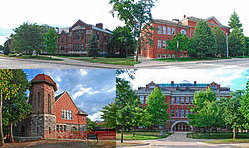 |
|
| Location | Ypsilanti, Michigan |
|---|---|
| Area | 8 acres (3 ha) |
| Built | 1931 |
| Architect | Ernest W. Arnold, Frank Eurich Jr., Malcomson and Higginbotham |
| Architectural style | Colonial Revival, Art Deco |
| NRHP reference No. | 84000017 |
| Added to NRHP | October 4, 1984 |
Eastern Michigan University's main campus is in Ypsilanti, Michigan. It has 122 buildings and covers 800 acres.
Other EMU Locations
EMU also offers classes at seven other locations. These are called satellite campuses. Courses have been offered in Jackson, Michigan since the 1970s. Other locations include Flint, Traverse City, Livonia, Detroit, Monroe, and Brighton.
- EMU–Brighton – Brighton, Michigan
- EMU–Detroit – Detroit
- EMU–Jackson – Jackson, Michigan
- EMU–Monroe – Monroe, Michigan
- EMU–Northern Michigan – Traverse City, Michigan
- Kresge Environmental Center – Lapeer, Michigan
Learning at EMU: Academics
Becoming an EMU Student
| Admissions statistics | |
|---|---|
|
2024 entering
classChange vs. 2019 |
|
| Admit rate | 79.6%
(
|
| Yield rate | 9.7%
(
|
| Test scores middle 50%* | |
| SAT Total | 930–1150 |
| SAT EBRW | 480-600
(
|
| SAT Math | 440-570
(
|
| ACT Composite | 18–27
(
|
| High school GPA† | |
| Top 10% | 12%
(
|
| Top 25% | 36%
(
|
| Top 50% | 67%
(
|
| Average | 3.33
(
|
|
|
EMU is considered "selective" by U.S. News & World Report. For students who started in fall 2024, EMU accepted about 79.6% of applicants. About 9.7% of accepted students chose to attend.
The average GPA for new students in fall 2024 was 3.33. The middle 50% of SAT scores ranged from 930 to 1150. ACT scores ranged from 18 to 27.
| 2024 | 2023 | 2022 | 2021 | 2020 | |
|---|---|---|---|---|---|
| Applicants | 21,337 | 20,351 | 19,919 | 17,506 | 15,957 |
| Admits | 16,992 | 16,555 | 16,578 | 14,811 | 11,997 |
| Admit rate | 79.6 | 81.3 | 83.2 | 84.6 | 75.2 |
| Enrolled | 1,650 | 1,898 | 891 | 2,312 | 1,922 |
| Yield rate | 9.7 | 11.5 | 5.3 | 15.6 | 16.0 |
| ACT composite* (out of 36) |
18-27
(5%†) |
18–26 (6%†) |
18–25 (6%†) |
18–25 (8%†) |
19–26
(20%†) |
| SAT composite* (out of 1600) |
930-1150
(71%†) |
910–1150 (71%†) |
930–1170 (68%†) |
950–1180 (55%†) |
980–1190
(89%†) |
| * middle 50% range † percentage of first-time freshmen who chose to submit |
|||||
| 2024 | 2023 | 2022 | 2021 | 2020 | 2019 | |
|---|---|---|---|---|---|---|
| Applicants | 2,533 | 2,256 | 2,331 | 2,875 | 3,620 | 3,993 |
| Admits | 1,703 | 1,603 | 1,670 | 2,129 | 2,395 | 2,752 |
| Admit rate | 67.2 | 71.1 | 71.6 | 74.1 | 66.2 | 68.9 |
| Enrolled | 886 | 814 | 861 | 1,139 | 1,312 | 1,445 |
| Yield rate | 52.0 | 50.8 | 51.6 | 53.5 | 54.8 | 52.5 |
Academic Programs and Colleges
| USNWR National University | 377 (tie) |
|---|---|
| Washington Monthly National University | 202 |
| Forbes | 623 |
|
|
|
| College of Arts and Sciences | 1959 |
| College of Education | 1959 |
| Graduate School | 1959 |
| College of Business | 1964 |
| College of Health and Human Services | 1975 |
| GameAbove College of Engineering and Technology | 1980 |
| Honors College | 2005 |
Eastern Michigan University offers many different degrees. Students can earn bachelor's, master's, and doctoral degrees. There are over 200 majors and minors for undergraduate students. There are also more than 170 graduate programs. EMU offers online courses and degrees too.
The university has seven main colleges and schools. These include the College of Arts and Sciences and the College of Business. EMU has offered graduate classes since 1939. The Graduate School has over 2,000 students.
The College of Education and the College of Arts and Sciences (CAS) are the oldest colleges. CAS is the largest, with 125 study programs. EMU has a long history of training teachers since 1849. Its Department of Special Education started in 1923, making it one of the oldest in the U.S.
The College of Business (COB) started in 1964. It moved to a new building in Downtown Ypsilanti in 1991. In 2020, the COB moved back to the main campus in Boone Hall. The COB is known for its "Ethos Week," which teaches business ethics.
The College of Human Services was created in 1975. Its name changed to the College of Health and Human Services in 1982. The newest college is the Honors College, founded in 2005.
Some of the most popular majors for students graduating in 2023 were:
- Registered Nursing
- Psychology
- Multi-/Interdisciplinary Studies
- Social Work
- Computer Science
- Marketing
- Speech Communication and Rhetoric
- Biology
- Accounting
- Business Administration and Management
University Library
The Bruce T. Halle Library opened in 1998. It has over 1,000,000 items for students to use. These include books, magazines, and recordings. The library is named after Bruce Halle, who founded Discount Tire and was an EMU graduate.
Student Life at EMU
| Race and ethnicity | Total | |
|---|---|---|
| White | 57.7% |
|
| Black | 16.7% |
|
| Other | 11.3% |
|
| Hispanic | 8.8% |
|
| Asian | 3% |
|
| Foreign national | 2% |
|
| Economic diversity | ||
| Low-income | 39% |
|
| Affluent | 61% |
|
EMU has many activities for students outside of classes. There are plays, musicals, and student groups. Popular places to hang out on campus include the Student Center and the Halle Library.
The Campus Life office plans fun events. These include Friday night movies and "Eastern Excursions" to nearby cities. Students also enjoy places off campus like Depot Town and downtown Ann Arbor.
Student Groups and Clubs
EMU has over 340 student clubs and organizations. Many academic departments have clubs for students interested in that subject. Students can also join volunteer groups like Habitat for Humanity. Other clubs include the Muslim Student Association and the LGBTA (Lesbian, Gay, Bisexual, Transgender/Transsexual Association).
EMU also has many Greek organizations, like fraternities and sororities. Many of these groups have houses near campus. Alpha Sigma Tau, a national sorority, was founded at EMU in 1899. Sigma Nu Phi, a local sorority, started in 1897. It is the oldest Greek group on campus.
Greek Life at EMU hosts "Greek Week" every April. This week celebrates unity among the Greek organizations.
Campus News and Media
The Eastern Echo is EMU's student newspaper. It is published several times a week during the school year. The paper is independent and not controlled by the university.
Cellar Roots is the school's student-run arts magazine. It has won many awards for its design.
EMU has two radio stations: WQBR and WEMU 89.1 FM. WEMU is a National Public Radio station that plays jazz music. WQBR is now called Eagle Radio and is an online-only station.
The LINGUIST List is a big online resource for the study of linguistics (the study of language). It was started in 1990 and is used by many experts worldwide.
University Traditions
Eastern Michigan has many traditions throughout the year. These include Homecoming and Martin Luther King Jr. Week. A unique tradition is the Pray-Harrold Kiosk.
The Pray-Harrold Kiosk is a large cement pillar outside the Pray-Harrold Building. Student groups paint it to share news or show unity. People say it started as a flagpole and has many layers of paint.
In the fall, traditions include EagleFest and Community Plunge. EagleFest helps new students learn about campus groups. Community Plunge lets students and staff volunteer in Ypsilanti.
In the winter, traditions include Ethos Week and the Gold Medallion Awards. Martin Luther King Jr. Week celebrates King's dream with speakers and events. Ethos Week promotes business ethics. The Gold Medallion Awards recognize great students, staff, and faculty. EMU's Relay For Life event supports the American Cancer Society.
Student Housing
Eastern Michigan University has 14 residence halls. About 5,000 students live on campus. Some halls are for first-year students, while others are for upperclassmen. Honors students live in Downing and Best Halls. EMU also has apartments for faculty, staff, and families.
In 2011, EMU started a program called "Keys to Degrees." It helps single parents live on campus with their children. They get extra support for their studies.
Dining services at EMU are run by Chartwells Higher Education. Students can eat at buffet-style dining halls, food courts, and convenience stores.
In 2022, EMU planned to spend $200 million to improve its residence halls. This includes renovating old halls and building two new ones.
EMU Sports: The Eagles
Eastern Michigan sports teams have won many national championships. They have won three NCAA Division II titles. They also won 13 NAIA Division I titles. These wins were in baseball, men's cross country, men's swimming and diving, and track and field.
EMU was also a national runner-up twice in NCAA Division I. In 1940, the men's cross country team finished second. In 1976, the baseball team lost in the final game of the College World Series. The Eagles have won the most MAC championships in men's swimming and diving, with 29 titles.
Eastern's men's basketball team has played in four NCAA Division I tournaments. In the 1996 tournament, they beat the Duke Blue Devils.
The 2006–2007 season was very successful for EMU. They won eight conference titles, which was a record for the school and the Mid-American Conference.
In 1987, EMU won its first Mid-American Conference football title. They then defeated San Jose State in the California Bowl.
Since 1991, EMU athletic teams have been called the "Eagles." Before that, they were called the "Hurons" from 1929 to 1991. The name was changed after a report suggested schools should stop using Native American logos.
Esports at EMU
The Eastern Michigan University (EMU) Esports program has grown a lot. It moved to a new, modern facility in the Student Center. This new space has over 20 computers. It allows competitive teams to practice and host tournaments. EMU Esports hosts events like a scholastic invitational for Valorant and Rocket League. The program aims to become well-known in college esports.
Famous People from EMU
EMU has over 145,000 living alumni (former students). Many famous people have attended Eastern Michigan.
Some notable politicians and public servants include:
- Frederick Fancher, 7th Governor of North Dakota
- Fred W. Green, 31st Governor of Michigan
- Marilyn Jean Kelly, Chief Justice of the Michigan Supreme Court
- Royal Copeland, U.S. Senator
- Rodney E. Slater, former U.S. Secretary of Transportation
Other famous alumni include:
- Billionaire Bruce Halle, founder of Discount Tire
- Jack Roush, founder of Roush Fenway Keselowski Racing
- Actor Dann Florek
- Animator Winsor McCay
- Actor Nagarjuna
- Judge Greg Mathis
- Cartoonist Dave Coverly
- Voice actor Ryan Drummond
Famous athletes from EMU include:
- Earl Boykins, Kennedy McIntosh, and "the Iceman" George Gervin from the NBA
- Maxx Crosby, Charlie Batch, and T. J. Lang from the NFL
- Brittni Mason, a multi-time Paralympic medalist, is also studying at EMU.
-
7th Governor of North Dakota Frederick Fancher
-
Former U.S. Senator from New York Royal Copeland
-
Founder of Roush Fenway Keselowski Racing Jack Roush
-
Las Vegas Raiders Defensive End Maxx Crosby
See also
 In Spanish: Universidad de Míchigan Oriental para niños
In Spanish: Universidad de Míchigan Oriental para niños
 | Shirley Ann Jackson |
 | Garett Morgan |
 | J. Ernest Wilkins Jr. |
 | Elijah McCoy |


